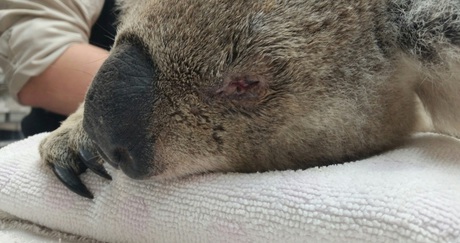New chemical to treat koalas with chlamydia

Australian scientists have announced a breakthrough in their quest for a new drug to treat koalas suffering from chlamydia. Writing in the journal Nature Scientific Reports, they report the discovery of a chemical that is paving the way for a new life-saving antibiotic.
Male and female koalas are affected by two species of chlamydia — C. pecorum and C. pneumoniae. The first causes eye disease, including inflammation and discharge, or urogenital disease, including cystitis, urinary incontinence and fibrosis, which can cause infertility. The second strain causes severe respiratory illness.
Koalas are responding poorly to antibiotic treatments commonly used in humans, suffering side effects such as emaciation and typically failing to recover completely from disease. Specialist koala vets are using two antibiotics — Baytril and Chloramphenicol 150 — however, there is less than two years’ supply of Chloramphenicol 150 remaining and neither of the current treatments works in all cases of chlamydial disease.
“Manufacture has stopped, supply has stopped and it can take years to develop a new drug,” said Dr Willa Huston from the University of Technology Sydney. “We are in a desperate search to find new, effective treatments and test other drugs that might help koalas recover from this horrible disease.”
Now, Dr Huston and collaborators from the Queensland University of Technology, Australia Zoo Wildlife Hospital and elsewhere have identified a chemical that paves the way for a new antibiotic to save koalas’ lives. The inhibitor, JO146, targets the serine protease HtrA for treatment of C. pecorum and C. pneumoniae in vitro and ex vivo.
In extensive laboratory tests on tissue samples from chlamydia-infected koalas, the team found the inhibitor to be highly successful at killing both C. pecorum and C. pneumoniae bacteria. Furthermore, it was low in toxicity against koala cells.
“It’s really urgent now that we put a concerted effort into developing this treatment further,” said Dr Huston, whose team is currently fine-tuning the chemical make-up of their discovery before testing on sick koalas.
“Time is running out. We all treasure our koalas and we need to do everything we can to cure this disease.”
Novel antibiotic activates 'suicide' mechanism in superbug
Researchers have discovered a new class of antibiotic that selectively targets Neisseria...
Modifications in the placenta linked to psychiatric disorders
Schizophrenia, bipolar disorder and major depression disorder are the neuropsychiatric disorders...
ADHD may be linked with an increased risk of dementia
An adult brain affected by attention deficit hyperactivity disorder (ADHD) presents modifications...




